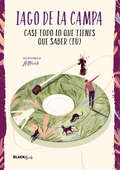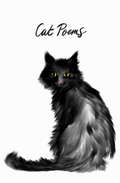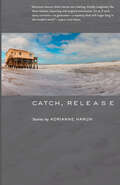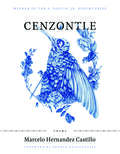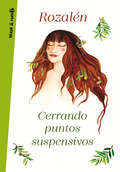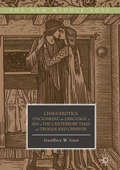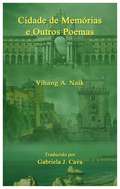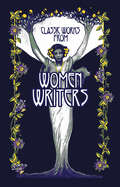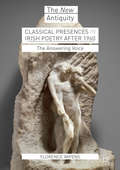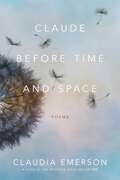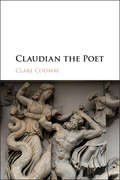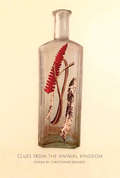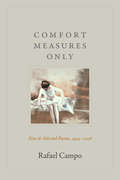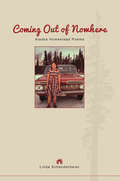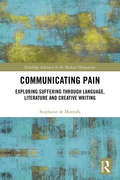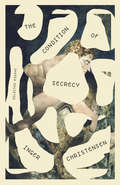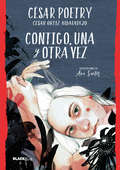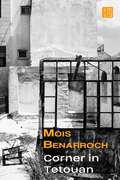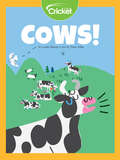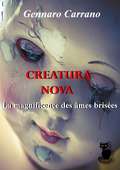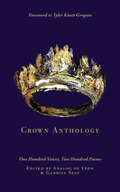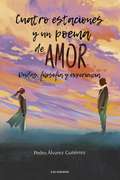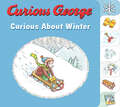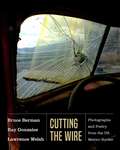- Table View
- List View
Casi todo lo que tienes que saber (Colección #BlackBirds #Volumen)
by Iago de la CampaTras Se me olvidó cómo olvidarte, Iago de la Campa nos trae una nueva joya de la poesía contemporánea. Ilustrado por Hittouch. Casi todas las que escuchamos y suenan a nosotros. Casi todas las que me pongo cuando no estás. Casi todas las que cumplimos solos, casi todas en las que no te quiero dejar de besar. Este es un libro sobre nuestras canciones, las que van de ti y de mí. Iago de la Campa escribe historias igual que compone canciones: con mucho tacto, pero directas al corazón. Con cada palabra que nace de su mente crea nuevos mundos llenos de vida. #BlackBirds un refugio íntimo de papel. Libros irresistibles para leer, guardar y compartir. Es una nueva colección de espíritu indie y juvenil con contenido de no-ficción moderno: poesía, microcuentos, reflexiones, diarios... Su diseño rompedor y la colaboración de conocidos ilustradores, bloggers e instagrammers dan vida a estos libros que son pequeñas obras de arte, caprichos, que todos querremos tener, leer y atesorar.
Cat Poems
by New Directions Tynan KoganeA gorgeous gift edition, dedicated to the mystery, grace, and charm of the cat Across the ages, cats have provided their adopted humans with companionship, affection, mystery, and innumerable metaphors; cats cast a mirror on their beholders; cats endlessly captivate and hypnotize, frustrate and delight. And to poets, in particular, these enigmatic creatures are the most delightful and beguiling of muses (Charles Baudelaire: “the sole source of amusement in one’s lodgings”) as they go about purring, prowling, hunting, playing, meowing, and napping, often oblivious to their so-called masters (Jorge Luis Borges: “you live in other time, lord of your realm—a world as closed and separate as a dream”). Cat Poems offers a litter of odes to our beloved felines by Charles Baudelaire, Stevie Smith, Christopher Smart, Denise Levertov, Lawrence Ferlinghetti, Rainer Maria Rilke, Muriel Spark, William Carlos Williams, Ezra Pound, and many others.
Catch, Release (Johns Hopkins: Poetry and Fiction)
by Adrianne HarunThe latest electrifying collection from acclaimed novelist and short story writer Adrianne Harun.Grand Price Winner, 2019 Eric Hoffer Book AwardIt’s all about loss. Don’t kid yourself. Even a simple game of catch is hinged on the moment the ball leaves the glove, the moment it returns. Don’t even try to think this story or any other story is about something else.In Catch, Release, Adrianne Harun’s second story collection, loss is the driver. But it’s less the usual somber shadow-figure of grieving than an erratically interesting cousin, unmoored, even exhilarated, by the sudden flight into emptiness, the freedom of being neither here nor there. In this suspended state, anything might happen—and it does. Harun’s most realistic stories are suffused with mystery, while her more fantastic tales reveal startling truths within the commonplace. In diverse settings that include, among other places, a British Columbian island, a haunted Midwestern farmhouse, a London townhome, and a dementia care facility overpopulated with dangerously idle guardian angels, characters reconfigure whole worlds as they navigate states defined by absence. In "The Farmhouse Wife," a young couple, struggling financially, takes up residence in a near-abandoned farmhouse, only to be joined by an inconvenient roommate, a woman whose own bereft state proves perilously seductive. A kleptomaniac father gets caught in one of his petty thefts in "Pearl Diving," propelling his two sons out of one life into another, perhaps more appropriate, one. In "Madame Ida," a family of little girls steadily invades a woman’s life as she puzzles out the mysteries of a missing sheriff-turned-cult-leader and the absence of her own son. And in the title story, two teenagers face off against the hurtful lies of an ancient con woman who is mining a widow’s grief for her own ends.Adrianne Harun has been described as an exacting and attentive stylist whose stories are rendered in vivid language. The Los Angeles Review of Books wrote of her work: "Harun finds beauty in pitch black; she makes poetry out of brutality and grace out of terror. She is an alchemist, turning the worst aspects of life into gold." With Catch, Release, Harun upends the world once more.
Cenzontle (A. Poulin, Jr. New Poets of America #40)
by Marcelo Hernandez CastilloWinner of the 2019 GLCA New Writers AwardAn NPR Best Book of 2018
Cerrando puntos suspensivos
by RozalénCantautora de primera línea, talentosa y comprometida, Rozalén nos regala una libre y honesta recopilación de reflexiones acerca de los momentos y situaciones más emocionantes e importantes de los últimos años. Los puntos suspensivos son finales abiertos y este libro, este inventario de recuerdos, es el punto y seguido que todos necesitamos para seguir adelante. En estas páginas se grita, se piensa, se reflexiona y se cuentan los silencios que hay detrás de cada sentimiento, de cada experiencia que Rozalén ha vivido en estos últimos años. En prosa y sin prisa, María se quita el paraguas que todos llevamos de serie y, sin cinturón de seguridad, deja que las palabras resbalen por su muñeca para contar y vivir con quien quiera leerlo todo lo que le llueve dentro, para compartirlo con cada lector que tenga el valor de mojarse.
Chaucerotics: Uncloaking the Language of Sex in The Canterbury Tales and Troilus and Criseyde (The New Middle Ages)
by Geoffrey W. GustChaucerotics examines the erotic language in Chaucerian literature through a unique lens, utilizing the tools of “pornographic literary theory” to open up Chaucer’s ribald poetry to fresh modes of analysis. By introducing and applying the notion of “Chaucerotics,” this study argues for a more historically-nuanced and theoretically-sophisticated understanding of the obscene content in Chaucer’s fabliaux and Troilus and Criseyde. This book demonstrates that the sexually suggestive language of this magisterial Middle English poet could stimulate and titillate various literary audiences in late medieval England, and even goes so far as to suggest that Chaucer might well be understood as the “Father of English pornography” for playing a notable, liminal role in the development of porn as a literary genre. In making this case, Geoffrey W. Gust presents an insightful account of an important intellectual issue and opens up the subject of premodern pornography to consideration in a way that is new and highly provocative.
Cidade de Memórias e Outros Poemas
by Vihang A. Naik Gabriela Jorge CavaVihang A. Naik traz à luz a vida de uma cidade em todas as suas sombras, glória e desgraça em seu livro Cidade de Memórias e Outros Poemas. É uma antologia de seus poemas intuitivos e filosóficos. Os poemas são divididos em seis segmentos: “Canção de amor de um andarilho” é mais ou menos um registro de viagens íntimo. “O homem espelhado” é sobre outras quimeras da cidade. As pessoas na cidade são imprevisíveis como o andar de um caranguejo ou as cores de um camaleão. Enquanto, “O caminho para a sabedoria” é sobre o embarque inicial à meditação e ao conhecimento. “À margem” registra o senso de futilidade, memoria, dor, exílio e alienação do poeta à margem da vida. O título desta coleção é também o título da última das seis sessões, na qual a cidade é revelada como um lugar de mercado, como um paraíso para oprimidos, e como uma semente de mudanças, e é observada ao anoitecer, à meia noite, pela luz da lua e pela névoa e bruma. O poema intitulado “Auto-retrato” começa com a diagramação de sete páginas em branco onde o leitor encontra apenas três palavras no final da última página. Aqui “o poeta se encontra em um momento de epifania, descobre a verdadeira natureza de si próprio quando acorda, ‘para ver/Eu” ‘descoberto além do pensamento’. Entre ‘Eu’ e ‘descoberto além do pensamento’ têm cinco páginas em branco. A epifania inefável e ambígua. Pode sugerir tanto a descoberta de um Eu transcendental além de todo pensamento e linguagem quanto pode sugerir a descoberta de uma Ausência além do pensamento e da fala humana.
Classic Works from Women Writers (Leather-bound Classics)
by A. J. OdassoA fine collection of classic novels, short stories, poems, and essays from distinguished women writers. Women writers have been making their voices heard for centuries, but their works were not always taken seriously. Over time, as women gained more social and political freedom, these works have reemerged as subjects that are considered to be worthy of closer study. Classic Works from Women Writers is a collection of more than thirty novels, short stories, poems, and essays by prominent and lesser-known female writers since the seventeenth century. Included in this volume are groundbreaking works such as Mary Shelley&’s Frankenstein; Agatha Christie&’s The Mysterious Affair at Styles, the first Hercule Poirot novel; Charlotte Perkins Gilman&’s short story &“The Yellow Wallpaper&” and her follow-up essay; and poetry from the likes of Christina Rossetti, Amy Lowell, and Sara Teasdale. The words of these authors offer a multitude of perspectives on different issues that affect not only women but the wider world as well.
Classical Presences in Irish Poetry after 1960: The Answering Voice (The New Antiquity)
by Florence ImpensThis book provides the first overview of classical presences in Anglophone Irish poetry after 1960. Featuring detailed studies of Seamus Heaney, Michael Longley, Derek Mahon, and Eavan Boland, including close readings of key poems, it highlights the evolution of Irish poetic engagements with Greece and Rome in the last sixty years. It outlines the contours of a 'movement' which has transformed Irish poetry and accompanied its transition from a postcolonial to a transnational model, from sporadic borrowings of images and myths in the poets' early attempts to define their own voices, to the multiplication of classical adaptations since the late 1980s -- at first at a time of personal and political crises, notably in Northern Ireland, and more recently, as manifestations of the poets' engagements with European and other foreign literatures.
Claude before Time and Space: Poems (Southern Messenger Poets)
by Claudia EmersonIn Claude before Time and Space, her final collection, Pulitzer Prize–winning poet Claudia Emerson quietly but fiercely explores the themes of mortality and time. <P><P>In the first section of this book, “The Wheel,” Emerson uses a rural southern setting in poems that reflect on memory, the self, and relationships. In section two, “Bird Ephemera,” she explores historical figures—from an early naturalist and writer who raised her children in poverty to a small-town doctor. The collection concludes with a series of poems named after the poet’s father. This illuminating body of work displays a master poet at the height of her craft.
Claudian the Poet
by Clare CoombeThis comprehensive reassessment of the carmina maiora of the fourth-century poet Claudian contributes to the growing trend to recognize that late antique poets should be approached as just that: poets. Its methodology is developed from that of Michael Roberts’ seminal The Jeweled Style. It analyses his poetics and use of story-telling to argue that the creation of a story-world in which Stilicho, his patron, becomes an epic hero and the barbarians are giants threatening both the borders of Rome and the order of the very universe is designed to convince his audience of a world-view in which it is only the Roman general who stands between them and cosmic chaos. The book also argues that Claudian uses the same techniques to promote the message that Honorius, young hero though he may seem, is not yet fit to rule, and that Stilicho's rightful position remains as his regent.
Clues from the Animal Kingdom (American Poets Continuum #167)
by Christopher KennedyIn his fifth collection of poems, Christopher Kennedy sifts through the detritus of the past to uncover the memories, images, and symbols that shape an individual’s consciousness. Looking to animals and their instincts for inspiration, drawing shape from the poet’s Irish Catholic working-class roots, these prose poems transcend grief and depression by seeking humanity’s place in the natural world.
Comfort Measures Only: New and Selected Poems, 1994–2016
by Rafael CampoIn Comfort Measures Only, Rafael Campo bears witness to the unspeakable beauty bound up with human suffering. Gathered from his over twenty-year career as a poet-physician, these eighty-nine poems—thirty-one of which have never been previously published in a collection—pull back the curtain in the ER, laying bare our pain and joining us all in spellbinding moments of pathos. The poet, who is also truly a healer, revives language itself—its sounds channeled through our hearts and lungs, its rhythms amplified through the stethoscope—to make meaning of our bewilderment when our bodies so eloquently and yet wordlessly fail us. Campo’s transcendent poems, in all their modernity amidst the bleep of heart monitors and the wail of ambulance sirens, remind us of what the ancients understood: that poetry sustains us, and whether we live or die, through what we can imagine and create in our shared voices we may yet achieve immortality.
Coming Out of Nowhere: Alaska Homestead Poems
by Linda Schandelmeier“The earth near our place/ was cradle, / it rocked us— / became our skin. / House doors opened, / spilled us out, / we disappeared into trees— / they clothed us in delirious green. /. . . We knew the song / of this place, made it up, / sang it—” Homestead life is often romanticized as a valiant, resilient family persisting in the clean isolation of pristine wilderness, living off the land and depending only on each other. But there can be a darker side to this existence. Linda Schandelmeier was raised on a family homestead six miles south of the fledgling town of Anchorage, Alaska in the 1950s and ’60s. But hers is not a typical homestead story. In this book, part poetic memoir and part historical document, a young girl comes of age in a family fractured by divorce and abuse. Schandelmeier does not shy away from these details of her family history, but she also recognizes her childhood as one that was unique and nurturing, and many of her poems celebrate homestead life. Her words hint at her way of surviving and even transcending the remoteness by suggesting a deeper level of human experience beyond the daily grind of homestead life; a place in which the trees and mountains are almost members of the family. These are poems grounded in the wilds that shimmer with a mythic quality. Schandelmeier’s vivid descriptions of homesteading will draw in readers from all types of lives.
Communicating Pain: Exploring Suffering through Language, Literature and Creative Writing (Routledge Advances in the Medical Humanities)
by Stephanie Potocka de MontalkCombining critical research with memoir, essay, poetry and creative biography, this insightful volume sensitively explores the lived experience of chronic pain. Confronting the language of pain and the paradox of writing about personal pain, Communicating Pain is a personal response to the avoidance, dismissal and isolation experienced by the author after developing intractable pelvic pain in 2003. The volume focuses on pain's infamous resistance to verbal expression, the sense of exile experienced by sufferers and the under-recognised distinction between acute and chronic pain. In doing so, it creates a platform upon which scholarly, imaginative and emotional quotients round out pain as the sum of physical actualities, mental challenges and psychosocial interactions. Additionally, this work creates a dialogue between medicine and literature. Considering the works of writers such as Harriet Martineau, Alphonse Daudet and Aleksander Wat, it enables a multi-genre narrative heightened by poetry, fictional storytelling and life-writing. Coupled with academic rigour, this insightful monograph constitutes a persuasive and unique exploration of pain and the communication of suffering. It will appeal to students and researchers interested in fields such as Medical Humanities, Autobiography Studies and Sociology of Health and Illness.
Condition of Secrecy
by Inger ChristensenFor the first time available in English, a selection of some of Inger Christensen’s most insightful essays and poetic prose pieces The Condition of Secrecy is a poignant collection of essays by Inger Christensen, widely regarded as one of the most influential Scandinavian writers of the twentieth century. As The New York Times proclaimed, “Despite the rigorous structure that undergirds her work—or more likely, because of it—Ms. Christensen’s style is lyrical, even playful.” The same could be said of Christensen’s essays. Here, she formulates with increasing clarity the basis of her approach to writing, and provides insights into how she composed specific poetry volumes. Some essays are autobiographical (with memories of Christensen’s school years during the Nazi occupation of Denmark), and others are political, touching on the Cold War and Chernobyl. The Condition of Secrecy also covers the Ars Poetica of Lu Chi (261-303 CE); William Blake and Isaac Newton; and such topics as randomness as a universal force and the role of the writer as an agent of social change. The Condition of Secrecy confirms that Inger Christensen is “a true singer of the syllables” (C. D. Wright), and “a formalist who makes her own rules, then turns the game around with another rule” (Eliot Weinberger).
Contigo, una y otra vez (Colección #BlackBirds)
by César PoetryCésar Poetry presenta una novela sensible y elegante sobre el amor, la soledad y la felicidad, acompañada de las bellas ilustraciones de Ana Santos. La vida da muchas vueltas, pero, a veces, no nos damos cuenta de que la Tierra es redonda y siempre hay una oportunidad para volver a empezar. <P><P>Y quien realmente merece la pena está dispuesto a darlas contigo, sujetando todos y cada uno de tus miedos. Eso es lo que encontrarás en estas páginas. Aquí dentro podría contarse tu historia, la historia de cómo las pequeñas cosas hacen que el corazón nos lata un poquito más deprisa. Antes de comenzar a leer este libro, deberías preguntarte lo siguiente: Si mañana todo acabara, ¿repetirías lo que estás haciendo hoy con esa persona? Yo lo tengo claro: «Contigo, una y otra vez.» <P>#BlackBirds un refugio íntimo de papel. Libros irresistibles para leer, guardar y compartir. Es una nueva colección de espíritu indie y juvenil con contenido de no-ficción moderno: poesía, microcuentos, reflexiones, diarios... Su diseño rompedor y la colaboración de conocidos ilustradores, bloggers e instagrammers dan vida a estos libros que son pequeñas obras de arte, caprichos, que todos querremos tener, leer y atesorar.
Corner in Tetouan
by Mois Benarroch J. P. CarrilloBook of poems published by Esquio directed by Julio Uceda. Mois Benarroch was born in Tetouan, Morocco, in 1959. At thirteen, he emigrates with his parents to Israel and lives in Jerusalem ever since. He started to write poetry at fifteen in English, then in Hebrew, and finally in his native tongue, Spanish. He published his first poems in 1979. In the 80s, he was part of vanguardist movements and was the editor of Marot magazine. His first book in Hebrew was published in 1994 under the title "The Immigrant's Couplets". He also published two books of stories, several books of poems in Hebrew, English, and Spanish, and four novels. In 2008 he won the Prime Minister's prize in Israel. In Spain, he has published his book of poems "Corner in Tetouan" (Esquío, 2000) and in 2005 the novel "Lucena" (Lf ediciones). In 2008, the publishing house Destino publishes his novel "At the Doors of Tanger". And in 2010, Escalera published "Love and Exiles". Benarroch has won the Prime Minister award (2008) and the Yehuda Amichay prize.
Cows!
by Leslie SharpeCows in the meadow, cows on the hill, cows peeking over the windowsill! Babies and toddlers will enjoy this funny rhyming poem about the silly things cows do on their farm.
Creatura Nova La magnificence des âmes brisées
by Sonia Broyart Gennaro CarranoL'Immolata, la Gentile, Sensibilitade, Delicato, L'Eros, Pallida. Un voyage poétique à la recherche des différentes facettes de l'âme humaine où le bien et le mal, l'amour et la haine se confondent, où le pardon devient culpabilité. Où se trouve la frontière entre ce qui est juste et ce qui ne l'est pas ? La conscience est-elle réellement un jugement impartial ? La morale est-elle seulement un conditionnement de la société ? Une lutte éternelle entre instinct et raison... " Con Rassegnatio Et Assolutio Tollereresti Un Riprovevole Atto?" " Nell'Odiar Vivrei Angustiato!"
Crown Anthology: One Hundred Voices, Two Hundred Poems (Lost Poets)
by Analog de Leon & Gabriel SageTwo hundred poems of hope and empowerment in a time of tumult and darkness, from Instagram’s Lost Poets community. Crown Anthology is a new collection of verse from an online subculture of poets, with a foreword by Tyler Knott Gregson, one of the movement’s foremost authors. By celebrating self-love, self-worth, and empowerment, these two hundred poems examine life in a dynamic and transformative poetry compilation that speaks soft words reminding us that every soul is royal. Featuring a beautifully diverse and inspirational set of voices from around the world, which includes some of today’s most influential modern poets with additional contest winners chosen from 4,500 submissions, Crown Anthology is curated to be a light in the wild dark, illuminating the crown that exists in everyone.
Crown Anthology: One Hundred Voices, Two Hundred Poems (Lost Poets)
by Analog de Leon & Gabriel SageTwo hundred poems of hope and empowerment in a time of tumult and darkness, from Instagram’s Lost Poets community. Crown Anthology is a new collection of verse from an online subculture of poets, with a foreword by Tyler Knott Gregson, one of the movement’s foremost authors. By celebrating self-love, self-worth, and empowerment, these two hundred poems examine life in a dynamic and transformative poetry compilation that speaks soft words reminding us that every soul is royal. Featuring a beautifully diverse and inspirational set of voices from around the world, which includes some of today’s most influential modern poets with additional contest winners chosen from 4,500 submissions, Crown Anthology is curated to be a light in the wild dark, illuminating the crown that exists in everyone.
Cuatro estaciones y un poema de amor: Dudas, filosofía y experiencia
by Pedro Álvarez GutiérrezMírate y espera a que tu corazón hable. Supe que los altibajos son tan feos como un domingo echándote de menos. Era lunes. Prometí no volver a ser débil y dejé que nuestro amor volviera a nacer. Pensé en la primavera, perosolo era un sábado de enero. No aguanté esconderte. Fui y te besé, me besaste. Y lo demás fue una historia de amor.
Curious George Curious About Winter (Curious George)
by H.A. ReySpend a snowy day with George in this picture book for preschoolers! Preschoolers will delight in exploring a typical winter day in this ebook featuring everyone's favorite monkey, Curious George. From shoveling to snow angels, coats to cocoa, little ones will enjoy a perfect day of winter play with Curious George in this ebook! Join George and the man with the yellow hat as they watch the first snowflakes fall, go sledding, and warm up by the fire in this book that incorporates age-appropriate concepts like counting, colors, and seek-and-find.
Cutting the Wire: Photographs and Poetry from the US-Mexico Border
by Ray Gonzalez Bruce Berman Welsh LawrenceCutting the Wire, a masterful collaboration between photographer Bruce Berman and poets Ray Gonzalez and Lawrence Welsh, offers us a way to look again, to really look, at the border between Mexico and the United States. Berman, who has photographed and lived in El Paso for decades, is a documentarian who uses his camera to record what&’s in front of him rather than for, as he puts it, &“mere self-expression.&” Berman&’s visual investigations of the everyday realities of the border—detention centers, smeltertown cemeteries, kids playing along a river levee, descanso crosses on telephone poles for the disappeared—are exactly the stuff the poetry of Gonzalez and Welsh is made of. The multilayered histories of the border landscape provide an inexhaustible supply of rich and fertile raw material for both Gonzalez and Welsh. But their poetic visions allow them to capture elements of a personal and collective past that historians have often failed to record.
